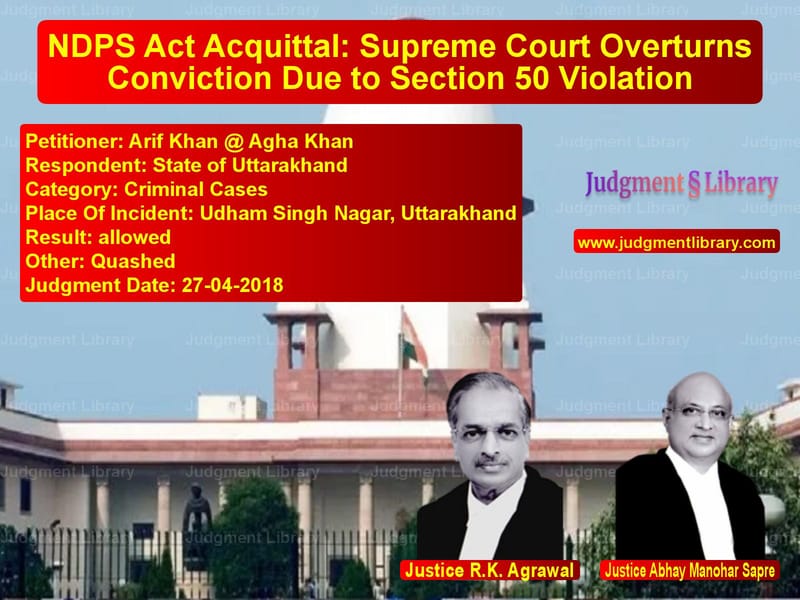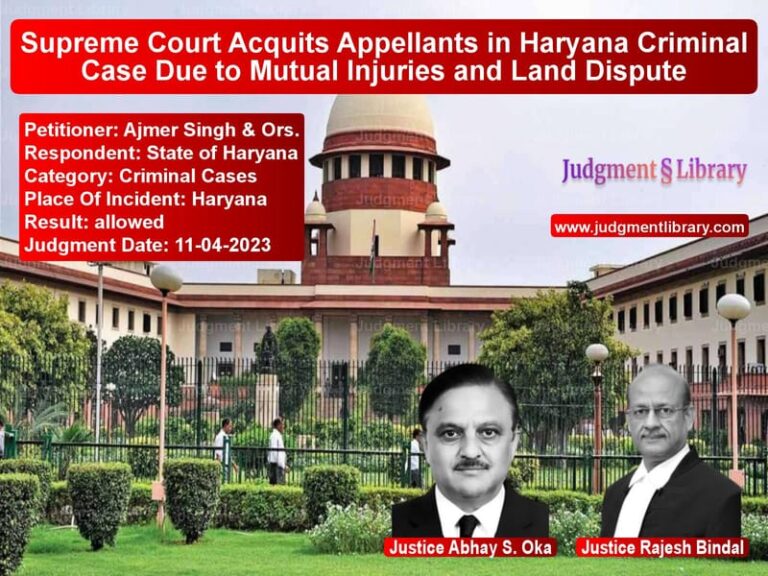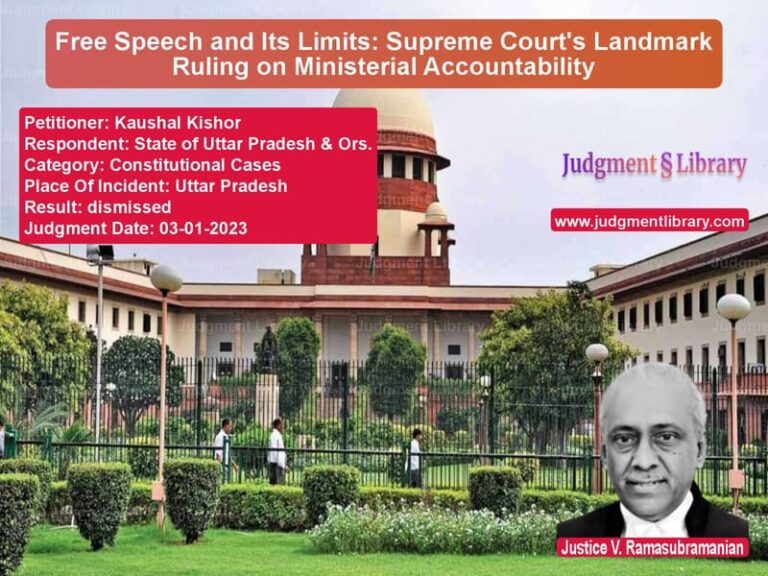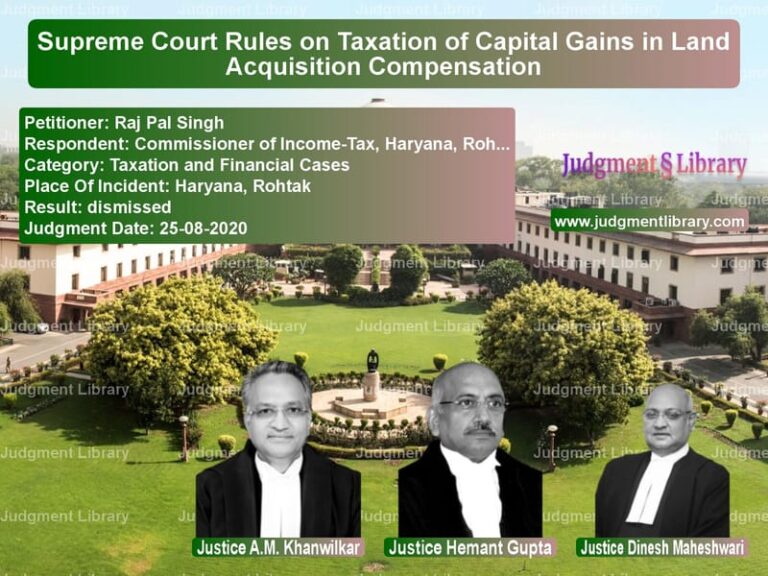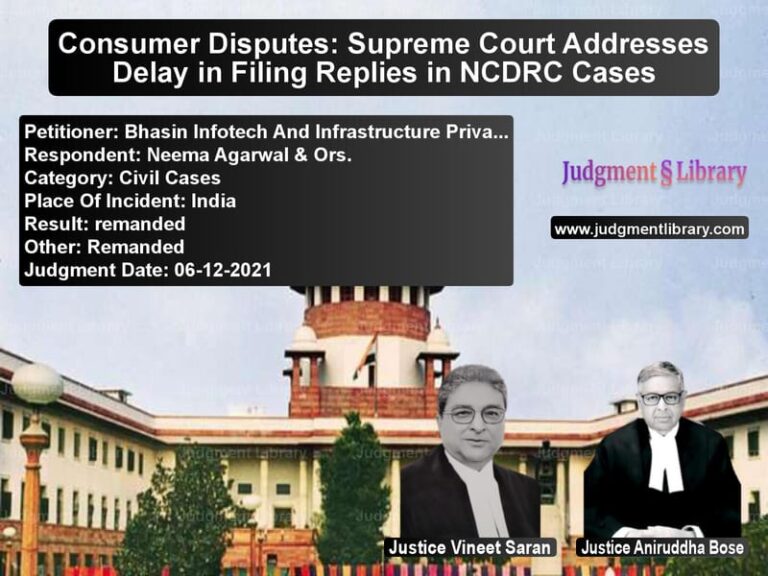NDPS Act Acquittal: Supreme Court Overturns Conviction Due to Section 50 Violation
The case of Arif Khan @ Agha Khan vs. State of Uttarakhand revolves around the conviction of the appellant under the Narcotic Drugs and Psychotropic Substances Act, 1985 (NDPS Act). The Supreme Court had to decide whether the mandatory requirements under Section 50 of the NDPS Act were followed during the search and seizure of contraband from the accused. The case serves as a significant precedent on procedural safeguards in drug-related offenses.
The appellant was convicted under Section 20 of the NDPS Act for possession of 2.5 kg of charas. The trial court sentenced him to ten years of rigorous imprisonment along with a fine of Rs. 1,00,000. The High Court upheld the conviction. However, the Supreme Court set aside the conviction on the grounds of non-compliance with Section 50 of the NDPS Act.
Background of the Case
On November 23, 2002, the police received secret information about an individual carrying contraband on a roadways bus. Acting on this information, a raiding party led by the Station House Officer (SHO) of Kichha police station intercepted the accused near a railway crossing in Uttarakhand. Upon being stopped, the accused admitted to carrying charas. The police conducted a search and recovered 2.5 kg of charas from his possession.
The appellant was informed of his right to be searched in the presence of a Magistrate or a Gazetted Officer, but he consented in writing to be searched by the police officers themselves. The trial court found the appellant guilty, and the High Court upheld the verdict. The case was then appealed to the Supreme Court.
Key Legal Issues
- Whether the search and recovery of contraband were conducted in compliance with Section 50 of the NDPS Act.
- Whether failure to comply with Section 50 renders the entire trial void.
- Whether voluntary consent by the accused to be searched by police officers is sufficient compliance with Section 50.
Arguments by the Appellant (Arif Khan @ Agha Khan)
- The appellant argued that the prosecution had failed to ensure compliance with the mandatory provisions of Section 50 of the NDPS Act.
- He contended that the search and seizure were conducted by police officers instead of in the presence of a Magistrate or a Gazetted Officer, rendering the search illegal.
- The appellant’s counsel cited Vijaysinh Chandubha Jadeja vs. State of Gujarat (2011), where the Supreme Court held that compliance with Section 50 is mandatory.
- It was argued that merely informing the accused of his right was insufficient and that the police should have ensured the presence of a Magistrate or a Gazetted Officer.
Arguments by the Respondent (State of Uttarakhand)
- The State contended that the accused was informed of his right and had given written consent to be searched by the police.
- It was argued that since the accused voluntarily waived his right, there was no violation of Section 50.
- The prosecution maintained that the search and seizure were conducted lawfully and that the evidence clearly established the guilt of the accused.
Supreme Court’s Observations
The Supreme Court examined the issue of compliance with Section 50 of the NDPS Act in detail. The key observations were:
- Section 50 of the NDPS Act mandates that if a person is to be searched for contraband, they must be given the option to be searched in the presence of a Magistrate or a Gazetted Officer.
- The Constitution Bench ruling in State of Punjab vs. Baldev Singh (1999) and Vijaysinh Chandubha Jadeja (2011) reaffirmed that non-compliance with Section 50 vitiates the search and renders the entire trial unlawful.
- The prosecution failed to prove that the search was conducted in the presence of a Magistrate or a Gazetted Officer.
- Consent by the accused to be searched by police officers does not amount to compliance with Section 50.
- The procedural safeguard under Section 50 is not a mere formality but an essential requirement to prevent unlawful searches.
Final Judgment
The Supreme Court ruled in favor of the appellant and set aside his conviction. The Court held:
- The prosecution’s failure to comply with Section 50 rendered the search and seizure illegal.
- The trial and conviction were nullified as the fundamental procedural safeguard was violated.
- The accused was acquitted of all charges.
- It reaffirmed that compliance with procedural safeguards is necessary to ensure fairness in criminal trials.
Legal Significance of the Judgment
This judgment reinforces the importance of following due process under the NDPS Act. The ruling establishes that:
- Strict compliance with Section 50 is necessary, and failure to do so results in acquittal.
- The right to be searched before a Magistrate or a Gazetted Officer is a safeguard against unlawful arrests.
- Consent to waive this right is not sufficient to cure procedural defects.
- The burden is on the prosecution to prove compliance with procedural safeguards.
Impact on Future Cases
The Supreme Court’s decision will impact numerous pending and future cases under the NDPS Act. Law enforcement agencies must ensure compliance with Section 50 to avoid wrongful convictions. The ruling also emphasizes that technical compliance with legal procedures is essential to uphold justice.
Overall, this case serves as a reminder that procedural safeguards cannot be overlooked in the interest of expediency. The judgment upholds the principle that the rule of law must be followed in all cases, even when dealing with serious offenses like drug trafficking.
Petitioner Name: Arif Khan @ Agha Khan.Respondent Name: State of Uttarakhand.Judgment By: Justice R.K. Agrawal, Justice Abhay Manohar Sapre.Place Of Incident: Udham Singh Nagar, Uttarakhand.Judgment Date: 27-04-2018.
Don’t miss out on the full details! Download the complete judgment in PDF format below and gain valuable insights instantly!
Download Judgment: Arif Khan @ Agha Kha vs State of Uttarakhand Supreme Court of India Judgment Dated 27-04-2018.pdf
Direct Downlaod Judgment: Direct downlaod this Judgment
See all petitions in Drug Possession Cases
See all petitions in Bail and Anticipatory Bail
See all petitions in Judgment by R K Agrawal
See all petitions in Judgment by Abhay Manohar Sapre
See all petitions in allowed
See all petitions in Quashed
See all petitions in supreme court of India judgments April 2018
See all petitions in 2018 judgments
See all posts in Criminal Cases Category
See all allowed petitions in Criminal Cases Category
See all Dismissed petitions in Criminal Cases Category
See all partially allowed petitions in Criminal Cases Category

